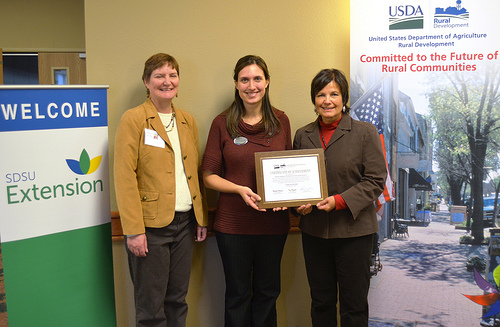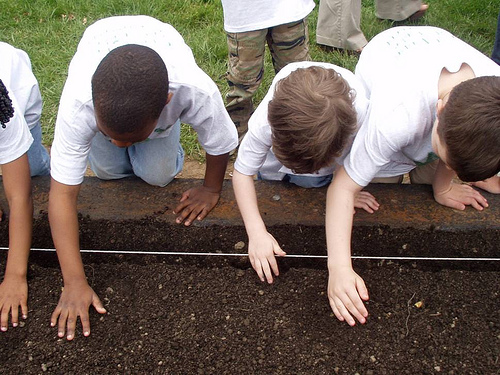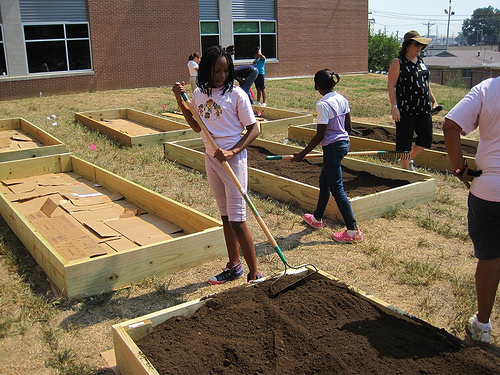
Straight from the freezer to students’ lunch trays, schools are finding ways to serve local berries all year long. Photo credit: Deborah Kane
It’s February and, as tends to happen every year, I’m starting to run low on frozen berries. It seems the hours upon hours I spent this summer freezing the season’s bounty weren’t enough to satisfy my family’s endless demand for berry smoothies. Every year I vow to put more berries away for use in the winter. I suspect this summer will be no exception; I’ll take the pledge again. Read more »
Demand for local and regional foods is strong and growing, as consumers across the country are looking for healthy food options grown and raised in their own communities. USDA has long supported this effort along with the procurement of regional foods by schools and helping them increase food literacy among the nation’s children.
These efforts will be the topic of the “Showcasing Local Foods” session at USDA’s 2013 Agriculture Outlook Forum, February 21-22, where Dr. Sonny Ramaswamy, director of USDA’s National Institute of Food and Agriculture (NIFA), will moderate a panel of speakers to discuss how local foods can lead to more nutritious diets. Lela Reichart with the Pennsylvania Department of Agriculture will discuss the Specialty Crop Block Grant Program, which focuses on nutrition knowledge and related topics. USDA Food and Nutrition Service’s Deborah Kane will discuss the Farm to School Program that isbringing more locally sourced fresh fruits and vegetables into school cafeterias. Tom Coon, from Michigan State University, will discuss Cooperative Extension’s role in educational programs related to regional and local food systems. Read more »

South Dakota State Director Elsie Meeks presents funds to South Dakota State University Extension for an online Local Foods Center while attending the 2012 South Dakota Local Foods Conference. Pictured left to right, Dr. Rhoda Burrows and Chris Zdorovtsov, SDSU Extension; and State Director Meeks.
The second annual South Dakota Local Foods Conference was held recently to continue the dialogue on local foods among producers, consumers, farmer’s markets, retailers, schools and others. The conference provided attendees from across the state two days of breakout sessions, networking, and instruction.
USDA Rural Development State Director, Elsie Meeks attended the conference, taking the opportunity to award South Dakota State University (SDSU) Extension a Rural Business Opportunity Grant of $50,000. The Rural Development funds will be used to build capacity in South Dakota’s local food system through the establishment of an online Local Foods Center which will create structured connections between local growers and resource providers. Read more »
Tags: Consumers, Elsie Meeks, Farm to School, Kansas, KYF2, local foods, Producers, RD, Rural Business Opportunity Grant, South Dakota, South Dakota Department of Agriculture, Specialty Crops
 Know Your Farmer, Know Your Food, Rural Development
Know Your Farmer, Know Your Food, Rural Development
New Jersey Farm to School Network and Edible Jersey Magazine recently awarded their inaugural School Garden of the Year Award to three projects for innovative efforts to connect their school gardens to the cafeteria, curriculum, and community. How fitting that schools in the Garden State are host to a number of exemplary school gardens!

Students at Lawrenceville Elementary School in Lawrenceville, NJ cultivate their school garden from planting to harvest!
Read more »
An apple for the teacher? Yes, and the cafeteria too.
Classic images of eager children handing perfect apples to their teacher abound. In the idealized imagery, the apples are often shiny, red, and round. And if you are angling for a good grade, or really like your teacher, the apples are big. But in New Hampshire it was “school boy” apples, the small ones 2 – 3 inches in diameter, which launched an impressive farm to school program.
The New Hampshire Farm to School Program (NHFTS) was established in 2003 as a pilot program funded by the USDA’s Sustainable Agriculture Research & Education (SARE) program to introduce local apples and cider into New Hampshire K-12 schools.
“We really saw the small apples as an entry point for our farm to school program. Not many supermarkets or other vendors are interested in the smaller fruit, but they are the perfect size for schools,” said Elisabeth Farrell, Sustainability Program Manager of the Sustainability Institute at the University of New Hampshire. Read more »

Students at Barack Obama Elementary School, near St. Louis, learn about healthy food choices through gardening.
Acting Deputy Undersecretary for Rural Development Judith Canales recently had the opportunity to visit Missouri’s new Barack Obama Elementary School located in a suburb of St. Louis. The school district has started the Barack Obama Elementary Healthy Food Pilot Project where the objective is to serve a healthier school breakfast and lunch menu. As part of this pilot project, the Farm to School Program is being incorporated to bring in more locally grown produce. The elementary school has also created a school garden in partnership with community members, community-based organizations, and a local community gardening group. It appears that they are on the right track! Read more »




